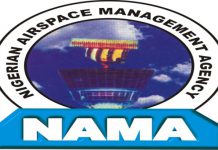The Lagos Chamber Commerce and Industry (LCCI), has slammed the Nigerian Aviation Handling Company Plc (Nahcoaviance) for failure to stop badly processed and packaged goods from being be exported through its facility.
The chairman, export group of LCCI), Mrs. Boson Solarin who decried such an oversight, said the development has elicited negative reactions.
Solari bore her mind on the matter at the second edition of Aviacargo Conference 2022 held recently in Lagos under the theme: ‘The role of insurance and regulations in the growth of aviacargo and export business in Nigeria.’
She said allowing badly processed cargo to leave Nigeria is one of the reasons products from the country continuously receive negative responses.
She said such goods are denied access to markets and where they are allowed, they cannot compete with cargoes from other countries.
“Our products receive negative comments outside the country. I was worried the only time I went to NAHCO and saw what our people freight out of this country, and we allow them,” she said.
On the challenge of limited exports, Solarin said Nigerians are more interested in importation of goods rather than promoting export.
She stated that as the government tries to make policies to discourage import dependency, people devise ways to circumvent them.
“We must, as a people, develop the willingness to help this country out of its predicaments. We must deliberately embrace exportation through deliberate support to/for players in the sector,” she added.
On product certification, Solarin urged the National Agency for Foods Drug Administration and Control (NAFDAC) to certify production facilities.
However, she wondered why Nigeria should have many registration numbers for the same products such as plantain flour.
The LCCI chief therefore called on NAFDAC to register facilities with facility numbers for each company as obtained at Food and Drug Administration (FDA) and Hazard Analysis and Critical Control Points (HACCP) in the US.
“If we must move forward as a country, especially with African Continental Free Trade Area (AfCFTA) staring us in the face, NAFDAC should certify production facilities. Why should Nigeria have many registration numbers for the same product, example plantain flour? Why not just a registration of the facility, with facility numbers for each company as done by FDA and HACCP,” she said.
She advised the government to place less emphasis on revenue generation for some agencies saying the disadvantages of such outweigh the merits.
Solarin pointed out that despite the fact that NAFDAC is in Nigeria, the agency is still difficult to get.
She explained that there are many Micro, Small and Medium Enterprises (MSMEs) now in production and that NAFDAC charges about N40, 000 for one product with a maximum of five products allowable for registration for micro businesses.
She said it does not bother the agency whether such business have the capacity to do more.
Solarin further disclosed that the cost for one additional product (the 6th) attracts N90, 000 adding that NAFDAC would still collect eight products each for laboratory analysis.
She also stated that businesses are tasked daily by the Standards Organisation (SON) to be certified to the Mandatory Conformity Assessment Programme (MANCAP).
MANCAP is a product certification scheme put in place by SON to ensure that all locally manufactured products in the country conform to the relevant Nigerian Industrial Standards (NIS) before they are presented for sale in the market or exported.
Solarin said, however, that there are no standards to process the applications and called on SON to do more as it costs almost N1.5 million to get the minimum 3rd party HACCP certification that some countries still accept.
She recalled when in 2021, the Nigerian Export Promotion Council (NEPC) bridged the gap when it paid to assist 120 exporters to get certified with HACCP and International Organisation for Standardisation (ISO).
“More funding is required in this space if we must overcome the challenges, access to markets will also continue to be an illusion without proper and acceptable certifications,” Solarin added.
She assured that the LCCI “is ever ready to partner with well-meaning Nigerian businesses and stakeholders to advocate for continued good governance and business ethics that will help resolve some of these issues.”
























































